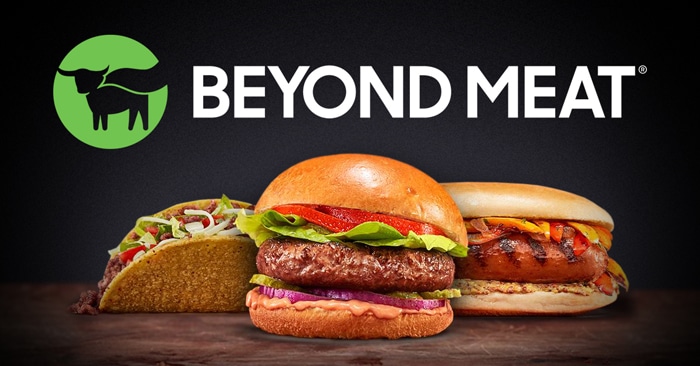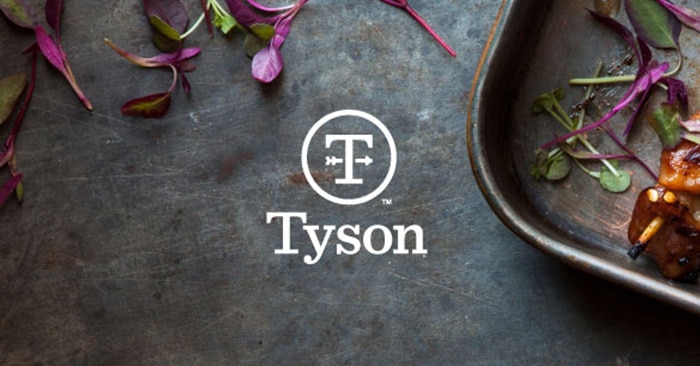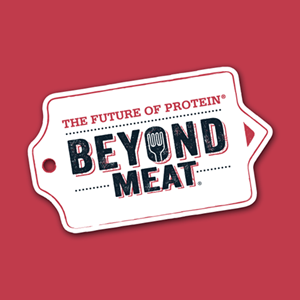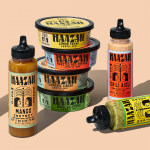Beyond Meat Sales Soar; Tyson Suffers as Plants Close
While production issues currently plague the meat industry, plant-based meat companies are growing. In their respective quarterly earnings calls this week, executives from meat company Tyson and plant-based brand Beyond Meat discussed powering through a pandemic — and trying to develop future strategies despite looming uncertainty.
Beyond Meat Sales Soar
A year after its IPO, plant-based company Beyond Meat announced its first quarter results yesterday, with net revenues of $97.1 million, a 141% year-over-year increase, and net income of $1.8 million. The brand also announced plans to launch larger pack sizes in response to a spike in retail demand.
During a call yesterday CEO Ethan Brown said the company had the four top selling plant-based meat SKUs for the month ending March 22, with sales up 233% year-over-year and velocity growing 195%, outperforming the category (93%).
However, the company withdrew full-year guidance as uncertainty from the pandemic remains: many of its 34,000 U.S. foodservice partners are offline or seeing slowdowns. The company quickly shifted to repack its U.S. foodservice supply for retail, Brown noted. Additionally, its launch into Starbucks in China last month marked an “important milestone” for the company, Brown said.
“It has long been our aspiration to be a global protein company and being of service to the growing demand for high-quality protein in China is a key part of our strategy,” he said.
But the “significant boost” in retail only partially offset a sharp overall decline in foodservice during the pandemic, CFO Mark Nelson said. Moving forward, one of the brand’s “biggest focal points” is launching value packs in both club and grocery channels, Brown said, noting that the brand’s household penetration is 3.6%.
“We have a group of consumers that are not only consistently buying, but consistently buying more,” Brown noted. “I think there’s enough momentum around our brand that we can get people to try it; maybe they’ll buy the two-pack, but we can offer more aggressive pricing on that as well this summer.”
Beyond Meat’s products, which are currently in 25,000 U.S. stores including Kroger, Target and Costco, may soon be priced competitively with its animal-based counterparts amidst meat shortages and increasing prices for meat — and Beyond Meat aiming to reduce its own prices. The company’s brand awareness grew 125% to 52% as of January, and “aggressive pricing” will drive trial as shoppers seek meat substitutes, Brown noted.
As consumers hunker down at home, Beyond Meat is also seeing momentum from Amazon Fresh and plans to launch its own direct-to-consumer (D2C) platform by the end of Q2, Brown said.
Even with the brand’s current lineup in high demand, innovation is set to continue after releasing five new products in the past year, Brown added. The company last year dedicated 6.9% of net revenue to R&D, and had increased its manufacturing capacity threefold year-over-year by the end of Q1. However, retail rollout for Beyond Breakfast Sausage is delayed due to COVID-19.
Certain marketing programs are also on hold. While meat supply problems could provide a unique window to push plant-based food, Beyond Meat’s current marketing focuses on its Feed a Million+ campaign, launched April 6, which aims to donate over 1 million Beyond Burgers to frontline workers and food banks via restaurant partnerships and celebrity brand ambassadors.
“I don’t think you’ll see us launch major campaigns right now. I don’t think this is the right time to do that,” Brown said. “We’ll continue to try to be a solution. And one of the ways we can be a solution is to offer lower pricing.”
The brand has some hearty competition: plant-based brand Impossible Foods this week launched in 1,700 Kroger stores — increasing its retail footprint 18-fold — after last month adding 777 stores. But according to Brown, “there’s a place for both of us.”
Tyson Expects Continued Slowdown
Meat producer Tyson saw profits dwindle during the second quarter, with net income falling to $364 million from $426 million in 2019, according to an earnings call Monday.
Net sales rose 4.3% to $10.9 billion — a record for the company — driven by a 2.6% volume increase and 1.6% price increase. But profit margins slumped during the quarter, and CEO Noel White said the company expects more slowdowns as plants are closed and capacity is reduced in production facilities due to worker absenteeism and social distancing.
“While we cannot anticipate how long the challenges presented by COVID-19 will persist, we remain focused on driving long-term growth,” White said in a release.
President Trump on April 28 issued an executive order to keep meat production facilities open. Tyson had already closed some of its 100-plus plants due to COVID-19, despite earlier efforts to mitigate illnesses amongst its 116,000 workers. The company on Monday reopened its Pasco, Washington and Waterloo, Iowa locations, with limited production at the latter, and added mobile clinics for employees, including free COVID-19 testing.
“Simply put, we will not send anyone into our plants to work unless we are confident that it’s safe,” White said. “And to do that, we have transformed how we operate.”
According to a May 1 Centers for Disease Control (CDC) report there have been COVID-19 cases in 115 meat and poultry processing facilities in 19 states, which employ 130,000 workers; as of Wednesday, the CDC reported 4,913 confirmed cases and 20 deaths during the month of April. Cases at companies including JBS and Smithfield have caused U.S. pork production to decrease about 50%, Tyson president Dean Banks said, just as retailers are struggling to restock items.
“Supermarkets and club stores have been trying to meet heavy demand, and we’ve been able to convert a number of production lines from foodservice to retail to help meet those consumer needs,” White said.
But the retail demand will not offset foodservice losses, White said, especially as stores start to limit purchases: retailer Costco this week moved to limit fresh poultry, beef and pork purchases to three items per shopper. White said a fourth quarter recovery for the company depends on the reopening of schools and other foodservice outlets.
Tyson also has its sights on a plant-based footprint, having sold its stake in Beyond Meat last April and launched its own plant-based brand Raised & Rooted in September. Further rollout for the line was not discussed during the call.



















